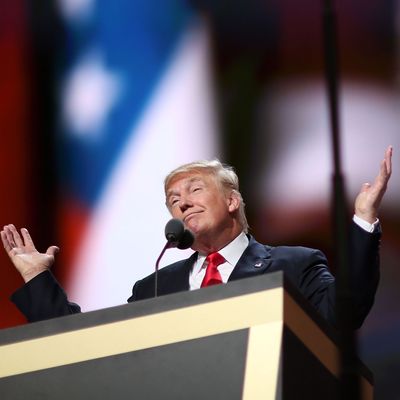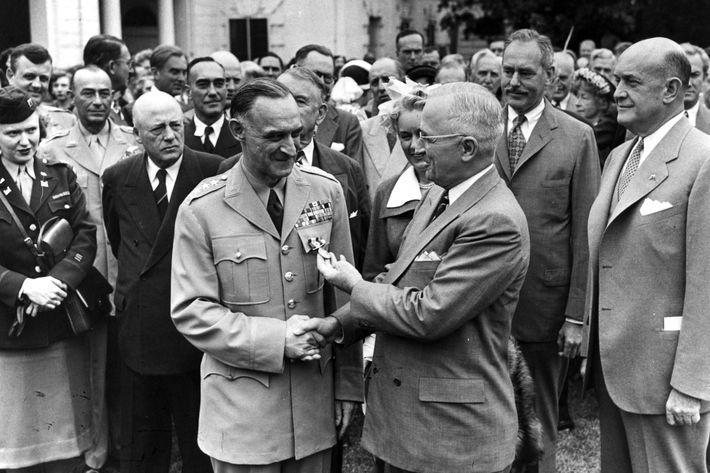
The cultivation of friendly candidates in elections in other countries, and efforts to intervene on their behalf, is a staple of Vladimir Putin’s foreign policy. Putin’s Russia has been proven or credibly alleged to have boosted friendly candidates in France, Germany, Austria, and, most successfully, in the election of a pro-Russian government in Ukraine. Something like this seems to be happening in the American presidential election now. Several weeks ago, Franklin Foer wrote in Slate about the web of suspicious financial ties connecting Trump and his leading Russia adviser to the Kremlin. The story attracted little attention — maybe it was too far-fetched, or maybe the daily stream of cable-news ticker-friendly public outrages spewed out by Trump, which required no inference, blotted out a much deeper one that lay half-buried. But recent events have propelled the story into the presidential campaign.
First, in Cleveland, Trump’s campaign, which had generally steered clear of platform disputes, threw around its weight to block a plank endorsing defensive military aide to Ukraine. Next, Trump shocked the foreign-policy Establishment by telling reporters that, contrary to decades of American policy, he might renege on America’s commitment to defend NATO allies in the event of a Russian invasion. And then, last weekend, emails from the Democratic National Committee that had been hacked by Russia appeared on WikiLeaks. The emails, which showed staffers pulling for Hillary Clinton despite the organization’s professed neutrality, created a rift between bitter supporters of Bernie Sanders and the party Establishment at a time when it was trying to tamp down discord in the service of concord. Clinton’s campaign manager is now stating openly that Russia is trying to help Trump.
And oddly enough, the drama is having a second-order effect that is more profound than the direct hit from the email story. It is prying open a deep, decades-old ideological wedge between liberals and the left at just the moment when the two wings were seeking to form a united front against Trump.
What is the relationship between Trump and Russia? That Russia is pulling for Trump is at this point beyond any dispute. The Kremlin’s English-language propaganda channel RT and Russia’s army of Twitter trolls, as well as Russia’s internal propaganda, have all thrown themselves behind the Republican candidate. A series of reports (here, here, and here) have shown that Russia backed the operation to hack the DNC. Adrien Chen, who reported last summer on Russia’s army of internet trolls that spreads disinformation abroad, noted in December that the trolls he was tracking had begun posing as pro-Trump conservatives.
It is the other half of the equation that is more opaque. Putin is helping Trump, but what exactly is Trump giving him in return? As Foer notes, Trump’s habit of refusing to pay back people who loan him money means regular American banks won’t lend him money anymore, making him dependent on unusual sources of financing. He has cultivated deep personal and financial ties with Russia — and to do major business with Russia, unlike a reasonably free economy, is to do business with its ruling claque. Trump’s campaign manager, Paul Manafort, helped orchestrate Putin’s intervention in Ukraine. His Russia adviser Carter Page has deep ties to Russia and owns stock in Gazprom, the state-controlled firm that is a major source of the Kremlin’s financial and economic power. Michael Flynn, another Trump adviser, appears regularly on RT and refused to answer questions about whether he is paid to do so. Trump and Putin have exchanged lavish compliments.
Trump’s own financial ties to Russia are completely non-transparent and will remain so as long as he refuses to release his tax returns. With a normal candidate, the Russia connection would amount to a massive, disqualifying scandal. At minimum, the nominee would face overwhelming pressure to release his tax return — a standard requirement even without grounds for suspicion — to prove he is not getting paid by a hostile foreign power. To be clear, it is pretty improbable that Trump is literally working for Putin. But this hardly settles the question. First, for a risk as consequential as the willful penetration of the American government by a hostile power, “pretty improbable” is not improbable enough. Second, the more likely explanation for the web of ties between Trump and Putin is still fairly damning. You have a candidate with a long record of admiring despots in general and the Russian despot in particular, surrounded by advisers in his pay, and who is flamboyantly ignorant of policy. Given these circumstances, it would be hard to imagine how Trump could form views on Russia without Putin’s influence.
But the accusation that Trump’s relationship with Russia reeks of impropriety, in the media now by Clinton, has provoked a furious counterattack on the left. Even the indisputable notion that Russia is trying to help Trump (far from the more explosive charge that Trump is trying to help Russia) has been assailed on the left as “McCarthyism” by figures like Katrina vandenHeuvel, Glenn Greenwald, and many others.
The split runs along the same lines as the fissure between liberals and leftists dating from the origins of the Cold War. The Cold War began under the presidency of Harry Truman, a figure who was regarded by progressives of his era with emotions ranging from disappointment to outright disgust. That dismay propelled the third-party candidacy of Henry Wallace, who attracted a small but wildly enthusiastic following among idealists and the far left. Wallace lambasted Truman as a warmonger, a tool of Wall Street and big business, and a traitor to the legacy of Franklin Roosevelt (which, to the frustration of liberals, had stalled). Wallace depicted the Marshall Plan, the Berlin Airlift, and other Cold War policies as a plot to instigate World War III.

The hostility between Truman and the left of his era, I argued a couple of months ago, parallels the current dynamic between Clinton and the Bernie Sanders movement today. The Trump-Russia scandal has activated that same left-wing impulse. The American far left during Truman’s era, just like today, was not pro-Russia so much as it was anti-anti-Russia, and follows identical themes: Criticism of Russia’s domestic repression or aggressive foreign policy is merely a ploy to distract from and excuse America’s own failings, and provides dangerous support for American aggression, which could lead to war. So, just as the left of the ‘40s and ‘50s saw anti-Stalinism as an excuse for Jim Crow, a Glenn Greenwald today casts Russia’s human-rights record in an implausibly favorable light, and reflexively dismisses any contrary view as simple hypocrisy. When Russia menaces Ukraine, The Nation informs its audience that this is perfectly justifiable because Ukraine is not really a country at all.
Trump’s pro-Russia tilt has reenergized these Cold War tropes. The left-wing writer Corey Robin heartily endorses the Republican nominee’s statement that “When the world sees how bad the United States is and we start talking about civil liberties, I don’t think we are a very good messenger.” And in response to liberals aghast at Trump’s renunciation of upholding America’s commitment to NATO, Robin sneers at “the prospect of sending the US military off to fight Putin or whomever it is we’re now supposed to be willing to fight over NATO.” To clear up Robin’s apparent confusion, “whomever it is we’re now supposed to be willing to fight over NATO” is in fact whoever invades the members of NATO, all of whom are pledged to defend each other in the event of an attack. And “now” is in fact since NATO was formed in 1949.
Obviously, there are sound foreign-policy reasons for caution in American foreign policy toward Russia. Ukraine is not a NATO member, which explains why Russian incursions have not been met with a military response. The defining trait of the left’s anti-anti-Russia stance is not a reluctance to go to war, but an automatic habit of analyzing Russia’s behavior through the prism of American innocence and motivations, which are inevitably found wanting.
For whatever reason, Trump is the candidate who has given the most forthright expression to anti-anti-Russian beliefs of any candidate since circa 1948 Henry Wallace (just as he has given the most open expression of racist beliefs of any candidate since circa 1968 George Wallace). As the acrimony between Clinton-supporting liberals and their foes on the left spills out on the streets of Philadelphia, this historical irony is playing a minor role. The far left’s willingness to play into the opposing party’s hands displays not only its continued disgust with the Democratic Party’s nominee and Establishment, but a certain convergence of thought with the Republican nominee.
Update: The Nation has an editorial denouncing defending Trump’s relationship with Russia, under the headline “Against Neo-McCarthyism.” The Nation’s in-house Russophile Stephen F. Cohen echoes those views. The editorial hinges upon a loose definition of “McCarthyism,” a term I would use to mean “false accusations of disloyalty,” but which The Nation uses to mean “any accusation of being in agreement with Russia, whether true or not.”
The editorial asserts, “nobody has conclusively proven who hacked into the DNC’s network.” “Conclusive proof” is a pretty difficult standard, in the absence of a signed, notarized confession from Vladimir Putin. What we do have is the strong belief of experts both inside and outside the American government.
The editorial likewise argues that poor Trump is being smeared because he wisely opposes arming Ukraine:
To be sure, the GOP candidate has suggested that he may pursue a policy of détente with Russia. He also, in our view wisely, threw out a reckless plank in the Republican platform that pledged to further arm Kiev. But Trump is only following the lead of the current administration. Should we assert seditious links between President Obama’s policy and the Kremlin?
The editorial fails to mention nearly all the disturbing evidence of Trump’s unusually deep ties to the Russian regime, including the financial ties between his advisers and the regime, Trump’s repudiation of NATO, extensive praise for Putin, and the drumbeat of pro-Trump propaganda from Russia’s media. Instead, the editorial assumes that any questioning of a politician’s ties to Russia is McCarthyism by definition.
Inconveniently for The Nation, its anti-McCarthyism editorial seems to have been written before, but published after, the subject of its defense openly pleaded with Russia to violate American law on his behalf. The editorial laments, “liberal-media elites have joined with the Clinton campaign in promoting the narrative of a devious Russian cyber-attack.” Now Trump is also promoting this narrative – only, rather than calling it devious, it’s his actual policy.






























